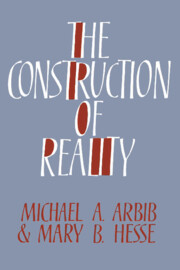Book contents
- Frontmatter
- Contents
- Preface
- Chapter 1 Posing the problem
- Chapter 2 The intelligence of the artificial
- Chapter 3 Schema theory
- Chapter 4 Relating mind and brain
- Chapter 5 Freedom
- Chapter 6 Freud on psychology and religion
- Chapter 7 Schemas: from the individual to the social
- Chapter 8 Language, metaphor, and a new epistemology
- Chapter 9 Interpretation and reality
- Chapter 10 Religions as social schemas
- Chapter 11 The Great Schema
- Chapter 12 Secular schemas
- References
- Author index
- Subject index
Chapter 5 - Freedom
Published online by Cambridge University Press: 22 September 2009
- Frontmatter
- Contents
- Preface
- Chapter 1 Posing the problem
- Chapter 2 The intelligence of the artificial
- Chapter 3 Schema theory
- Chapter 4 Relating mind and brain
- Chapter 5 Freedom
- Chapter 6 Freud on psychology and religion
- Chapter 7 Schemas: from the individual to the social
- Chapter 8 Language, metaphor, and a new epistemology
- Chapter 9 Interpretation and reality
- Chapter 10 Religions as social schemas
- Chapter 11 The Great Schema
- Chapter 12 Secular schemas
- References
- Author index
- Subject index
Summary
Problems of humanism in cognitive science
In the previous chapters, the authors take a neutral stance between two radically different perspectives – the secular and the religious. We describe some of the evidence and arguments for each perspective from a relatively dispassionate standpoint. We thus hope to indicate how developments in cognitive science can be used to illuminate both secular and religious interpretations of the human being and, in turn, be illuminated by them. In Chapters 9 and 10, we suggest that hermeneutic and symbolic approaches coming from the social sciences can be seen as potentially continuous with cognitive science. Just as scientific models of the mind are schemas for perception, learning, and intelligence, so hermeneutics, which studies the interpretation of texts from within different symbol systems, can be seen as expressing schemas for the interaction of the individual and the social. Indeed, we show how the schema theorist can use the concepts of hermeneutic circle, dialectic, and dialogue as heuristic hypotheses for extending the science from individual to social.
We have, however, touched on some issues indicating that this conciliatory view is not sufficient to solve the problems of the secular view of the human nor to do justice to the religious perspective. This chapter makes explicit some irreducible controversies between the two perspectives that we broadly describe as the “secular” and the “religious.”
- Type
- Chapter
- Information
- The Construction of Reality , pp. 85 - 104Publisher: Cambridge University PressPrint publication year: 1986



